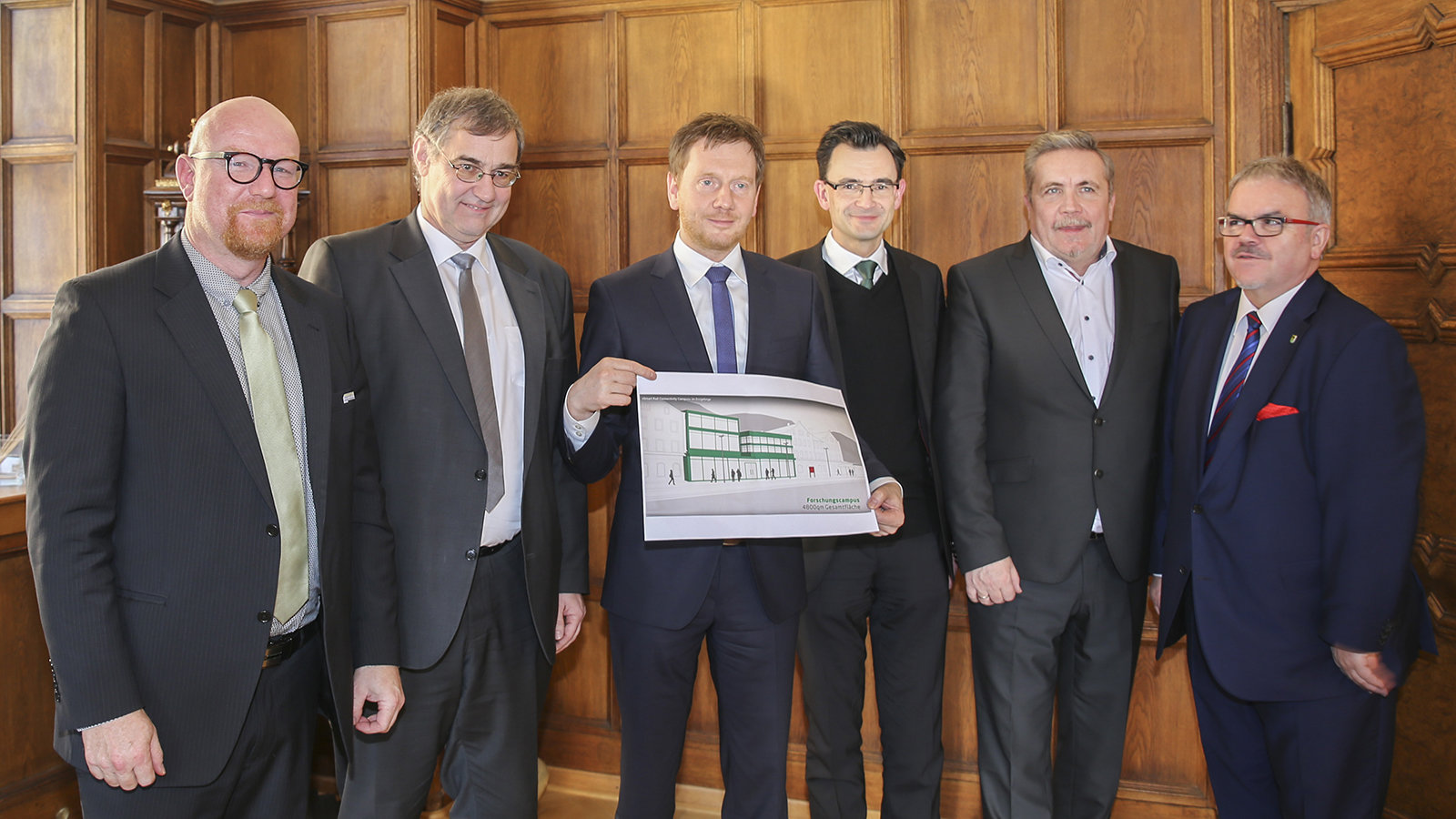A Tangible Vision: Pilot Project for Sustainable and Highly-Automated Train Traffic
Saxony’s Minister-President Michael Kretschmer gets informed about the “Smart Rail Connectivity Campus” in Annaberg-Buchholz
-

A vision that is nearly within reach: (from left) Sören Claus, Technical Director of the SRCC, Prof. Dr. Uwe Götze, Vice President for Transfer and Academic Qualification at Chemnitz University, Minister-President of Saxony Michael Kretschmer, Prof. Dr. Gerd Strohmeier, Chancellor of Chemnitz University of Technology, Rolf Schmidt, Mayor of Annaberg-Buchholz, and Frank Vogel, District Council Member of the Erzgebirgskreis, discussed the plans for the “Smart Rail Connectivity Campus”. Photo: Susann Oehme
The planned establishment of the “Smart Rail Connectivity Campus” (SRCC) in Annaberg-Buchholz is being followed with great interest by the Saxon State Government. On 21 January 2019, Minister-President of Saxony Michael Kretschmer was informed on-site about the current status of the project. “Here in Annaberg-Buchholz it is shown again what can be done by working closely together and being committed: The cooperation of TU Chemnitz, the city of Annaberg-Buchholz, the Deutsche Bahn, the Erzgebirgsbahn, Thales Deutschland and others, especially regional partners, greatly contributes to Saxony becoming a model region for sustainable and highly-automated rail travel,” says Kretschmer. Prof. Dr. Gerd Strohmeier, Chancellor of Chemnitz University of Technology, Prof. Dr. Uwe Götze, Vice President for Transfer and Academic Qualification at Chemnitz University, Mayor Rolf Schmidt and Sören Claus, Technical Director of the SRCC, spoke with the Minister-President about the outstanding potential for development and the prospects associated with the implementation of the project for the Free State of Saxony.
With the unique pilot project, highly automated transportation on railway tracks and smart drive technologies are to be further researched in the Erzgebirge, and innovative technologies will be developed, tested and brought forth for approval. At the same time, the plan is a key project that Annaberg-Buchholz and Chemnitz University are collaborating on together. For example, a university research facility is going to be built in the lower portion of the Annaberg-Buchholz train station. “With the SRCC we set out to accomplish a transfer of future highly-relevant technologies into our economy and into society as a whole, and we rely on the excellent cooperation of the city of Annaberg-Buchholz to help shape this and to help us work as a university in the region,” said Strohmeier.
Within the framework of the project, new and unique potentials exist, such as the topographically demanding test track between Schwarzenberg and Annaberg-Buchholz and a state-of-the-art technical infrastructure, including a “new generation” signal box, as well as a 5G telecommunications network along the test track. Numerous players from business, science and society are currently working on getting the project “on track”. Together, the project partners want to take significant steps towards the automated, digitised and ecologically sustainable future of rail transport.
The Vice President for Transfer and Academic Qualification of Chemnitz University explains the motivation of the university within this project: “Based on its three core competence fields of ‘Materials and Intelligent Systems’, ‘Resource-Efficient Production and Lightweight Construction’ as well as ‘Humans and Technology’, Chemnitz University already makes many contributions to sustainable research and highly-automated mobility, including lightweight construction and assistance systems, and this field will continue to be developed,” said Götze. The highly-motivated interplay between all the actors involved has already been shown in the concept phase of the project, which demonstrated the potential of the Smart Rail Connectivity Campus and how it can be used for the greater benefit of society via a close cooperation between politics, economy and science.
Ministry President Kretschmer said: “The project will not only further develop the ‘mobility of the future’, but will also be an important source of inspiration for the Erzgebirge economic region, which is why we will continue to support it, both on a state and federal level. The task of the state government is the create the conditions for such innovative research and development.
To implement the concept, a grant application has already been submitted in October 2018, within the program “We! – Change Through Innovation in the Region” (Wir! – Wandel durch Innovation in der Region) via the Federal Ministry of Education and Research (Bundesministerium für Bildung und Forschung). In the spring of 2019, the twelve winning projects of the completed concept phase of the Wir! Program will be published by the BMBF and will be awarded a contract plus subsidies of five to eight million euros each in the years 2019 and 2020 alone.
Further information on the “Smart Rail Connectivity Campus”: www.smart-rail.cc
(Author: Mario Steinebach / Translation: Jeffrey Karnitz)
Matthias Fejes
24.01.2019




